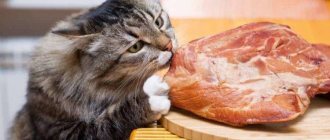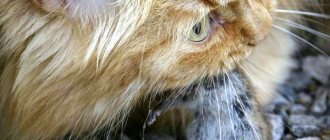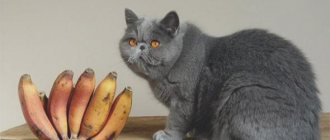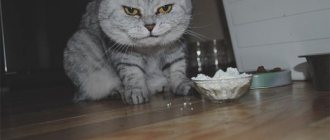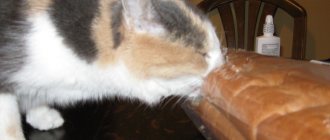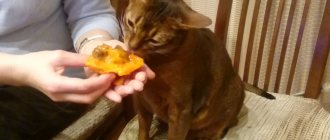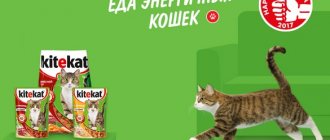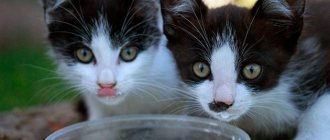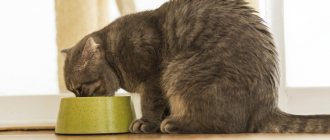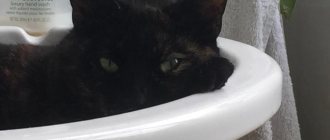What leads to a decrease in immune potential
Despite the fact that cats naturally have strong immunity, under the influence of various unfavorable factors, their protective forces weaken. Cats become vulnerable to viral, bacterial, and fungal attacks.
Causes of immune deterioration:
- lack of vaccinations;
- non-compliance with the vaccination schedule;
- unbalanced diet, cheap feed;
- unfavorable conditions of detention;
- hypovitaminosis;
- early weaning of kittens from cats;
- sudden change in diet;
- chronic, acute pathologies;
- neglect of deworming;
- violation of the rules of care and maintenance;
- pregnancy, lactation;
- infection with internal and external parasites (helminthiasis).
Stress, emotional shock, gross neglect, serious injuries, previous surgical operations, viral-bacterial, fungal infections also lead to weakened immunity in cats.
Deficiency of minerals, amino acids, vitamins against the background of poor nutrition, long-term use of antibacterial agents and other medications have a negative effect.
Cat owners should pay special attention to their pet’s immune system in early spring and autumn-winter.
What medications are there?
Among the immunostimulants that are used for animals and, in particular, cats, the most common are the following:
The medicine activates the animal’s body’s defenses to fight viruses.
- "Timogen". Stimulates the production of protective blood cells in the thymus gland. The drug is available in the form of a spray and is used to treat infectious diseases that are associated with immunodeficiency. More often, the immunomodulator is used after surgery or injury with wound infection. It is effective for viral hepatitis and bacterial skin lesions.
- "Neoferon". Enhances the production of antigens by leukocytes, which makes it possible to cope with infections. The drug helps the animal in the fight against viral diseases. It is better to drip it onto the mucous membranes of the animal, because this leads to maximum absorption of the product.
- "Immunol". A herbal preparation that has a stimulating effect on the immune system of cats and exhibits hepatoprotective and detoxification effects. Helps create stable post-vaccination immunity when used immediately after vaccination.
- "Immunoparasite". Used for any helminthic infestations or parasitic diseases. The product strengthens the protective mechanisms of the cat’s body and promotes rapid healing. The most common form of release is in the form of a powder, which is added to the pet’s food.
According to the scientific publication “Nonspecific immunotherapy for mammary cancer in cats”, author I.V. Gorinsky, the use of drugs called “Recoferon-Gamma” and “Laiferon” significantly reduces the size of malignant neoplasms of the mammary gland in pets.
Cancer immunotherapy in cats
How to understand that a cat has low immunity
If a furry pet's resistance decreases, its immunity weakens, the animal often gets sick. The body is vulnerable to viral and bacterial attacks.
The main manifestations of low immunity in cats:
- poor appetite, sudden weight loss;
- deterioration in wool quality;
- changes in behavior, mood swings;
- drowsiness, apathy, depression;
- discharge from the nose, eyes;
- unstable temperature.
Five-minute educational program
Almost all the media declare with pathos that “the immune system has not yet been studied.”
This is wrong. Immunology appeared more than 40 years ago, and during this time scientists have made many truly outstanding discoveries. Today we know a lot about immunity, but... With each new discovery, we increasingly want to say: “I know that I don’t know.” In short, there are really a lot of unsolved secrets in this area. Secondly, even many medical and veterinary specialists are somehow sure that the only purpose of immunity is to fight pathogenic microflora that has entered the body in one way or another. Oddly enough, this is not entirely true. Yes, protective systems actually destroy bacteria, viruses and fungi, but another area of their activity is maintaining the constancy of the body’s internal ecosystem. How can this be translated into human language?
Let's take cancer for example. A terrible disease that annually claims the lives of many thousands of people (and no one even counts animals). Do you think that the formation of a cancer cell in our body is something out of the ordinary? We will surprise you. In the body of animals and humans, tens of thousands (!) of potentially malignant cells are formed every day (!), but they are killed by the immune system. As you can understand, its significance is unrealistically great.
Why did we need to give these facts out loud? It's simple. Firstly, immunity is an incredibly complex system; research in this area will be enough for more than a dozen years (or even a couple of hundred). Secondly, its meaning is much more important than is commonly thought. What is the conclusion? It's simple. For cats with viral diseases, bacterial or fungal infections, immunomodulatory drugs are prescribed with caution, under the constant supervision of a veterinary specialist.
Remember the consequences of thoughtless interference with the immune system. So, around the 60s, there was a real boom in immunostimulants in the USSR. This is the well-known drug ASD, and aloe extract, and other drugs. These names are still heard by many. But it is still not widely advertised anywhere that in the early and late 80s of the last century, many Moscow pediatricians found out that “reliance” on immunomodulators leads to catastrophic consequences, up to the complete inability of the immune system to resist infectious diseases.
We invite you to familiarize yourself with: Anandin for cats composition and release form instructions for use
Similar conclusions were drawn in the United States, where the distribution of these drugs occurred at approximately the same time. Since then, doctors have been very wary of immunostimulants. Veterinarians have come to this conclusion only in recent years.
How to boost your cat's immunity
An effective effective method that activates the launch of specific antibodies to certain types of pathogenic elements is preventive immunization (vaccination/re-vaccination). After vaccination, specific antibodies are formed against certain diseases.
Important! The effectiveness of the vaccine is 1-3 years, so do not forget to systematically revaccinate your pet.
What to do to boost your cat's immunity:
- Make dietary adjustments. Supplement natural ingredients with vitamin and mineral complexes. Feed only with professional quality food.
- Protect your cat from stress and emotional distress.
- Moderate physical activity, activity.
- Comply with sanitary and hygienic standards.
- Promptly treat for ectoparasites, remove worms every 34-60 days.
- Maintain intestinal microflora (enzymes, probiotics).
It is equally important to carry out systematic hygiene procedures and follow the veterinarian’s recommendations during the rehabilitation period after operations and illnesses.
What is meant by the term “immunomodulator”?
This is the name for medications that can enhance the body’s defense systems. Domestic manufacturers use the same techniques that were developed by the great Dorogov. This means that both products of plant origin (aloe, mulberry, pine needles) and animal products (placenta) are used as raw materials. However, sometimes more “spectacular” raw materials are used.
The most famous immunomodulator, which is officially used only in veterinary medicine, is Dorogov’s antiseptic stimulant, also known as ASD. Available in the form of second and third fractions. The second is a brownish-yellow liquid with a specific and pungent odor. ASD-3 is similar in consistency to a thick ointment with an even richer “aroma”.
We invite you to read: Domestic panthers for whom this is available
Both of these substances are made from slaughterhouse waste. Despite their not very presentable appearance and smell, the preparations are unique. They help with viral and bacterial infections, are able to destroy many types of pathogenic fungi (effective against lichen), and significantly enhance the natural resistance of the animal body. Its positive properties also include its relatively low cost.
How to strengthen a cat's immunity
To strengthen, activate, and restore protective forces, immunomodulators (immunocorrectors) are used in veterinary practice. Created on the basis of natural, microbiological, biological, synthetic components.
Immunomodulators for cats:
- Gamavit, Gamavitforte . Vitamin immunostimulating complex preparation with a pronounced antiviral effect. Contains minerals, amino acids. Prescribed for prevention and therapeutic therapy for various pathologies and viral infections. Improves natural resistance, accelerates the recovery period, eliminates the effects of stress and intoxication.
- Aminosol . A veterinary drug that stimulates the immune system based on hydrophilic vitamins, amino acids, liquid salts for cats of different breeds and age groups. Prescribed for stress, loss of appetite, septic conditions, oncology, to restore the body after operations, illnesses, as well as during periods of intensive growth and development.
- Immunophore . Increases resistance to infections, stress, resistance, normalizes immunity.
- Imuno-Vet for cats . The composition of the drug includes extracts of medicinal herbs and plants. Used in cases of weakened immunity, to normalize metabolism, in the treatment of fungal and viral infections, and in the postoperative period. The veterinary drug has an anti-inflammatory and antibacterial effect. It has a beneficial effect on the nervous, respiratory and reproductive systems of the body. Increases resistance to pathogenic agents.
- Vetom 1.1 . A complex drug for the treatment of various diseases, stimulation of defenses. Accelerates growth, normalizes metabolic processes, removes toxins from the body. Used for various immunodeficiency conditions in animals.
- Pharmax . Vitamin and mineral preparation. Improves immunity, increases the body's resistance to infections, accelerates the process of recovery and rehabilitation. Helps cope with stress, normalizes metabolism.
- Roncoleukin . Prescribed in the treatment of purulent-inflammatory and oncological diseases. Prescribed to restore immunity.
- Glycopene . Eliminates post-vaccination complications, increases the effectiveness of vaccines, stimulates regeneration, increases cellular immunity, and reduces the risk of developing oncological processes.
- Evinton . Complex veterinary drug for stimulation and enhancement of nonspecific immunity. Prescribed in the treatment of viral diseases of unknown etiology.
When should a cat be given vitamins?
Of course, not every cat needs to take vitamin complexes. So, if an animal eats good super premium or holistic food, then all the necessary microelements are already included in its composition. But if the pet is on natural feeding, that is, eats food from the common table, then this can cause a lack of vitamins. There are also special situations when it is worth giving your cat vitamins.
- During pregnancy and lactation, the need for microelements increases.
- Kittens also do not always have enough food for proper growth and development, especially if it is ordinary inexpensive food.
- Sterilized and neutered cats are given vitamins to normalize hormonal levels and prevent obesity.
- For hair loss and weakened immunity, special vitamin complexes are needed to eliminate a specific problem.
Dosage
The medicine is prescribed to cats in the form of subcutaneous or intramuscular injections. A single dose is 1 ml, regardless of the weight of the animal. Subcutaneous injections are placed in the withers area. You need to pull back the skin at the withers, spread the fur and insert the needle at an angle of 45 degrees. The medicine should be administered slowly.
The thigh area is best suited for intramuscular injection. It is better to use syringes with thin needles (for example, insulin). There is no need to treat the injection site. The syringe is injected to a depth of 1-1.5 cm at an angle of 90 degrees, then the medicine is poured in.
When treating, you should follow the recommendations of a veterinarian, who takes into account the condition of the animal and the severity of the disease. For preventive purposes, injections are usually given once a quarter, to prevent stress - once 12-18 hours before a possible stressful situation. In other cases, injections are given once a day, at the same hours:
- for plague - 5-6 injections;
- viral enteritis, gastrointestinal infections – 1-2;
- rhinotracheitis, adenoviruses – 3-4;
- pathologies of the reproductive organs – 3.
